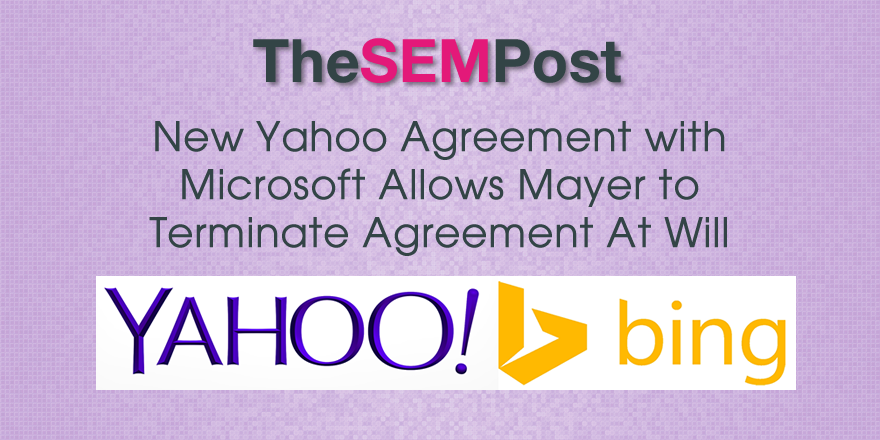 We have some more details about the search deal that Yahoo and Microsoft renegotiated, and it was clear that Yahoo’s CEO Marissa Mayer was in the driving seat on this one. The document was filed with the SEC and is very eye opening, particularly with some of the changes that Mayer managed to push through in the renegotiation.
We have some more details about the search deal that Yahoo and Microsoft renegotiated, and it was clear that Yahoo’s CEO Marissa Mayer was in the driving seat on this one. The document was filed with the SEC and is very eye opening, particularly with some of the changes that Mayer managed to push through in the renegotiation.
Among the newly released changes are an increase in the payouts – up to 93% of gross revenue before affiliate payouts, from the previous 88% of net revenue after affiliate payouts.
Yahoo is entitled to receive a percentage of the revenue (the “Revenue Share Rate”) generated from Microsoft’s services on Yahoo Properties and on Affiliate sites after deduction of the Affiliate sites’ share of revenue and certain Microsoft costs. Under the Search Agreement the Revenue Share Rate was 88% for the first five years and then increased to 90% on February 23, 2015. Pursuant to the Amendment, the Revenue Share Rate will be 93%, but will now apply before deduction of the Affiliate sites’ share of revenue.
Yahoo can use Bing’s search results without running Bing’s ads alongside. However, if they do this, Yahoo does not have to share any revenue from their own ads, but instead will pay Microsoft a serving fee for the results.
Commencing on May 1, 2015, Yahoo agrees to request paid search results from Microsoft for 51% of its search queries originating from personal computers accessing Yahoo Properties and its Affiliate sites (the “Volume Commitment”) and will display only Microsoft’s paid search results on such search result pages.
Additionally, Yahoo will now have the ability in response to queries on both personal computers and mobile to request algorithmic listings only, paid listings only or both algorithmic and paid listings from Microsoft. To the extent Yahoo requests algorithmic listings only or requests paid listings but elects not to display such paid listings, Yahoo will pay Microsoft serving costs but not a revenue share. In other cases and with respect to the Volume Commitment, Yahoo will pay Microsoft a revenue share.
Previously under the Search Agreement, Yahoo had sales exclusivity for Yahoo’s and Microsoft’s premium advertisers. Pursuant to the Amendment, this sales exclusivity will terminate on July 1, 2015. Yahoo and Microsoft will develop a plan to transition premium advertisers for Microsoft’s paid search services to Microsoft commencing on July 1, 2015 and to be completed by January 31, 2016.
Big perhaps the most startling is a clause that allows wither company to terminate the agreement “at will” at any time after October 1st. This is a huge change from the previous agreement that required Yahoo to prove performance thresholds were not being met in order to terminate.
The term of the Search Agreement remains 10 years from its commencement date, February 23, 2010, subject to earlier termination as provided in the Search Agreement. Pursuant to the Amendment, on or after October 1, 2015, either Yahoo or Microsoft may terminate the Search Agreement by delivering a written notice of termination to the other party. The Search Agreement will remain in effect for four months from the date of the termination notice to provide for a transition period, however, Yahoo’s Volume Commitment will not apply in the third and fourth months of this transition period.
It is no secret that Mayer wanted better terms for this agreement. She has a strong background in search from her time at Google but this deal was negotiated prior to her hiring as CEO.
All eyes will definitely be on Mayer to see what direction she goes for the source of the search results and the advertisements they run. It is known she would like to bring search back inhouse to Yahoo but it is unknown how far along they are with their search technology.